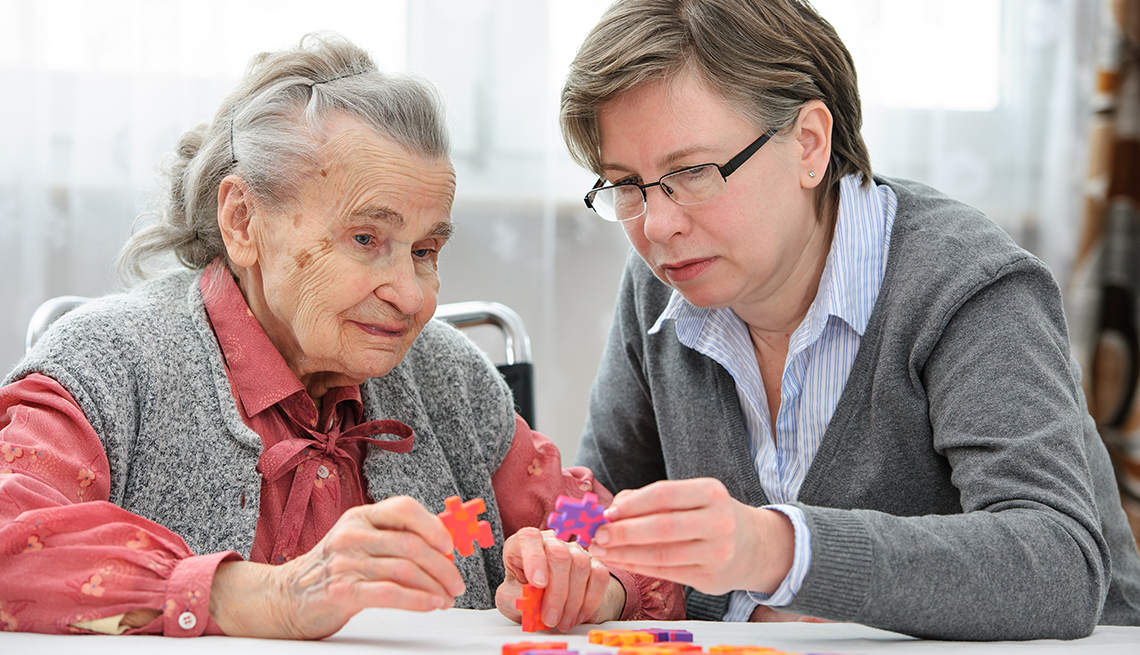Family caregivers cope with increasingly complex care
Family caregivers cope with increasingly complex care"
- Select a language for the TTS:
- UK English Female
- UK English Male
- US English Female
- US English Male
- Australian Female
- Australian Male
- Language selected: (auto detect) - EN
Play all audios:
A new AARP study of American family caregivers reveals that 26 percent are looking after relatives with Alzheimer's disease and dementia, a significant boost from 22 percent five years
ago. And, in general, the care they provide is growing more complex as recipients grow older and suffer more health problems, the study shows. The report, “Caregiving in the U.S. 2020,”
which AARP developed in conjunction with the National Alliance for Caregiving (NAC), found that the number of relatives caring for adults age 50 and older jumped significantly, with nearly
42 million adult Americans providing that care, up from 34 million in 2015. More family caregivers (32 percent) are tending to someone with memory problems, compared with five years ago,
when the figure was 26 percent. Further, 27 percent are caring for people with mental health issues (up from 21 percent). Many older Americans — 63 percent (an increase from 59 percent) —
need care because of long-term physical conditions, such as those with mobility problems that may mean they have to use a walker or a wheelchair and may be recovering from a stroke, surgery
or cancer treatment. All this can equal added burdens for family caregivers, as many juggle day jobs and other family responsibilities with the demands of caregiving, said Susan C. Reinhard,
AARP senior vice president and director of the AARP Public Policy Institute, who played a key role in the report, which is based on online surveys conducted in 2019 of more than 1,392
Americans age 18 and older who provided care for an adult in the past year. "I hold family caregivers in great esteem, and I've started to see them as a scarcity,” Reinhard said in
a telephone interview. Those caregivers help with a panoply of needs of those they care for: * 99 percent help with instrumental activities of daily living, such as paying bills and dealing
with insurance companies. * 60 percent help with activities of daily living, including bathing, dressing and eating. * 58 percent perform medical and nursing tasks, such as wound care and
managing multiple medications. * 71 percent monitor their care recipient's condition. * 65 percent communicate with health care providers about the recipient's care. * 56 percent
advocate for the recipient with care providers, community services or government agencies (up from 50 percent in 2015). FEELING OUR WAY Joel Johnson, 60, of Auburn, Washington, knows that
routine well. Seven years ago his wife, Nancy, then 52, was diagnosed with early-onset Alzheimer's disease, radically changing their lives.
Trending News
Pulsed corona discharge induced hydroxyl radical transfer through the gas-liquid interfaceABSTRACT The highly energetic electrons in non-thermal plasma generated by gas phase pulsed corona discharge (PCD) produ...
‘ihcl to establish skill development centre in kashmir’SRINAGAR, OCT 10: Indian Hotels Company (IHCL), India’s largest hospitality company, has announced its partnership with ...
11 quick questions for rory kennedy | members only accessMemorial Day Sale! Join AARP for just $11 per year with a 5-year membership Join now and get a FREE gift. Expires 6/4 G...
Chelsea loan out young trio | FourFourTwoKakuta and Van Aanholt will join up with Dutch side Vitesse Arnhem, where they both spent the entirety of last season on...
How the us benefits when it educates future world leadersWhen the number of international students at U.S. colleges and universities declines, commentators often focus on the ec...
Latests News
Family caregivers cope with increasingly complex careA new AARP study of American family caregivers reveals that 26 percent are looking after relatives with Alzheimer's...
Apple warns users not to sleep next to iphonesApple is warning consumers not to sleep with their iPhones while charging because the devices, cables and chargers can ...
Best birthday party - erykah badu's 45th at the bomb factoryLeast surprising fact of 2016: Erykah Badu knows how to throw a party. Ms. Fat Belly Bella herself has been celebrating ...
Could this method help if you lack confidence in learning french?Learning French can be tough. Many people assume that once they move to France, they will soak up the language easily, b...
Based on a scale of 1-10 anchovies.“Flipper” is push-button family filmmaking that could have used a stronger sense of porpoise. Plotwise, it ain’t much, j...
